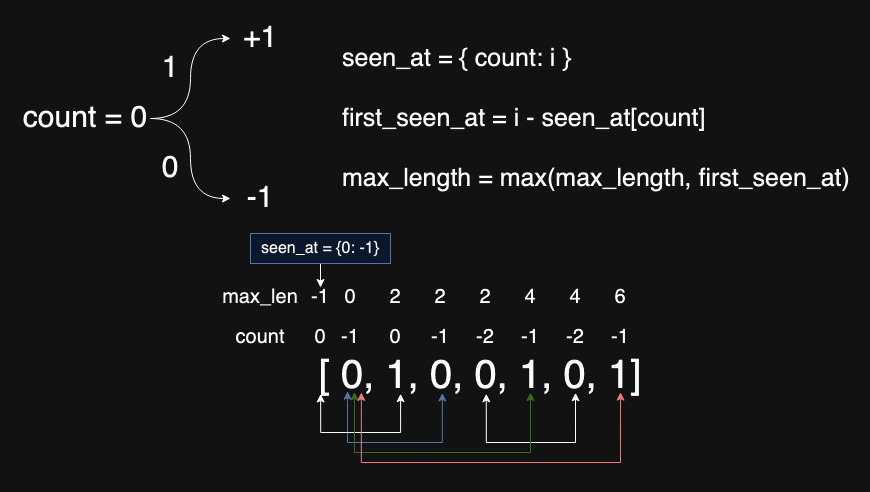525. Contiguous Array

Overview
We need to find out the maximum length of equal zeros and ones in the input binary array.
If the input is [0, 1, 0], the answer will be [0, 1] or [1, 0].
I referred to this YouTube video to learn how to resolve this problem.
Solution: Hash Table
Algorithm

-
Initialize a hash table to record the count and first seen at index.
Initialize max length and count for recording.
The hash table should be initialized as {0: -1},
to ensure the second element in the array can be calculated to the correct max length.-
nums = [0, 1]
num count max_length 0 -1 0 1 0 1 - (-1)= 2 -
nums = [1, 0]
num count max_length 1 1 0 0 0 1 - (-1)= 2
-
-
Iterate through the nums array.
-
The
countincrease with thenumwhen thenumis 1.
or decrease with thenumwhen thenumis 0. -
If the
counthas been recorded in thehash table,
update themax lengthifindexminus thefirst seen atis larger.Otherwise, record the
countwith theindex.
-
-
Return the
max lengthfor the answer.
Implement
class Solution: def findMaxLength(self, nums: list[int]) -> int: # { count: first_seen_at } seen_at = {0: -1} max_length = count = 0 for i, num in enumerate(nums): count += 1 if num == 1 else -1 if count in seen_at: max_length = max(max_length, i - seen_at[count]) else: seen_at[count] = i return max_length
Complexity Analysis
Time complexity: O(n)
Iterating through the nums array takes O(n).
Each loop takes O(1) with all the operations.
Space complexity: O(1)
We use an additional hash table to record the count and first seen at.
In the worst-case scenario,
it takes O(n) with the length of the nums array plus 1 (initialized with {0: -1})
when its all filled with 0 or 1.
[0, 0, 0] => {0: -1, -1: 0, -2: 1, -3: 2}
[1, 1, 1] => {0: -1, 1: 0, 2: 1, 3: 2}